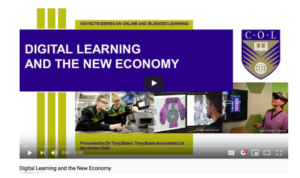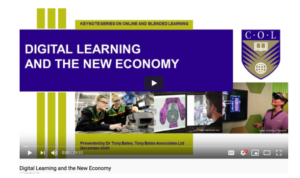Month: February 2021
Keynote presentations released as Open Educational Resources
Tony Bat es has released a series of five 40-50 minute keynotes which an be downloaded without cost from the Commonwealth of Learning’s online institutional repository for learning resources and publications, OAsis, under a Creative Commons license. The subjects of the keynotes are:
es has released a series of five 40-50 minute keynotes which an be downloaded without cost from the Commonwealth of Learning’s online institutional repository for learning resources and publications, OAsis, under a Creative Commons license. The subjects of the keynotes are:
- Developing quality blended learning courses
- Digital learning and the new economy
- New technologies and their potential and limitations for teaching and learning
- Ten lessons for online learning from the Covid-19 experience (based on research findings)
- Online learning in the (k-12) school sector
The intention is that these can be streamed during virtual conferences, included in education and training programs, or watched individually. As James Clay says on Twitter: "I think this is an interesting concept for future online events. However there is a difference between YouTube or Netflix and an online conference. How do you add value to an event so that it is more than just streamed video?"
I went to a couple of events last week that were trying different formats. One was a professorial inaugural lecture by Bob Harrison who, it seems insisted on prerecording his presentation so he could actively participate in the accompanying chat. The other was the OECD conference on AI and the Future of Work, where the real value was not presentations as such but great (and well prepared moderation of panels of speakers, with limited opportunities for particpant questioning.
However, coming back to Tony Bates's video keynotes, the real value I see with these is with remixing. They are released under a Creative Commons attribution, share alike license which means they are free to remix. This allows using (in my case short) clips from the video in Open Educational Resources for a MOOC we are developing on AI for vocational teachers and trainers and part of the taccle AI project. I'm going to have a go this afternoon.
Keynote presentations released as Open Educational Resources
Tony Bat es has released a series of five 40-50 minute keynotes which an be downloaded without cost from the Commonwealth of Learning’s online institutional repository for learning resources and publications, OAsis, under a Creative Commons license. The subjects of the keynotes are:
es has released a series of five 40-50 minute keynotes which an be downloaded without cost from the Commonwealth of Learning’s online institutional repository for learning resources and publications, OAsis, under a Creative Commons license. The subjects of the keynotes are:
- Developing quality blended learning courses
- Digital learning and the new economy
- New technologies and their potential and limitations for teaching and learning
- Ten lessons for online learning from the Covid-19 experience (based on research findings)
- Online learning in the (k-12) school sector
The intention is that these can be streamed during virtual conferences, included in education and training programs, or watched individually. As James Clay says on Twitter: “I think this is an interesting concept for future online events. However there is a difference between YouTube or Netflix and an online conference. How do you add value to an event so that it is more than just streamed video?”
I went to a couple of events last week that were trying different formats. One was a professorial inaugural lecture by Bob Harrison who, it seems insisted on prerecording his presentation so he could actively participate in the accompanying chat. The other was the OECD conference on AI and the Future of Work, where the real value was not presentations as such but great (and well prepared moderation of panels of speakers, with limited opportunities for particpant questioning.
However, coming back to Tony Bates’s video keynotes, the real value I see with these is with remixing. They are released under a Creative Commons attribution, share alike license which means they are free to remix. This allows using (in my case short) clips from the video in Open Educational Resources for a MOOC we are developing on AI for vocational teachers and trainers and part of the taccle AI project. I’m going to have a go this afternoon.
Artificial Intelligence degrees

mamir_k94 (CC0), Pixabay
The UK operates a central university admissions service, called UCAS. Today they have released their analysis of institutional and subject admissions for 2020. In an article in the online Higher Education newspaper, WONKHE, Sander Kristel, Chief Operations Officer at UCAS, points out some of the more striking features of the data.
He reports that Artificial Intelligence degrees have grown by more than 400 per cent in the past decade – from just 65 acceptances in 2011 to 355 acceptances in 2020.
As he says:
This growth will be music to the ears of employers according to research from the Industrial Strategy Council, which highlighted the adoption of automation as the biggest driver of a shift in skills and estimated that 39 per cent of the activities that people are paid to do in the UK today could be automated by 2030, with current technology creating demand in technology-related occupations such as software development.
Less welcome news, however, is that although the ratio of UK male acceptances to UK female acceptances across all Science, Technology, Engineering and Maths subjects has shrunk from 1.34 in to 1.06 over the last decade, there has been little progress made in closing the gap for computer science (6.2 in 2011, relative to 5.7 in 2020), perhaps related to the significant amount of growth in this subject overall.
Artificial Intelligence degrees

mamir_k94 (CC0), Pixabay
The UK operates a central university admissions service, called UCAS. Today they have released their analysis of institutional and subject admissions for 2020. In an article in the online Higher Education newspaper, WONKHE, Sander Kristel, Chief Operations Officer at UCAS, points out some of the more striking features of the data.
He reports that Artificial Intelligence degrees have grown by more than 400 per cent in the past decade – from just 65 acceptances in 2011 to 355 acceptances in 2020.
As he says:
This growth will be music to the ears of employers according to research from the Industrial Strategy Council, which highlighted the adoption of automation as the biggest driver of a shift in skills and estimated that 39 per cent of the activities that people are paid to do in the UK today could be automated by 2030, with current technology creating demand in technology-related occupations such as software development.
Less welcome news, however, is that although the ratio of UK male acceptances to UK female acceptances across all Science, Technology, Engineering and Maths subjects has shrunk from 1.34 in to 1.06 over the last decade, there has been little progress made in closing the gap for computer science (6.2 in 2011, relative to 5.7 in 2020), perhaps related to the significant amount of growth in this subject overall.


